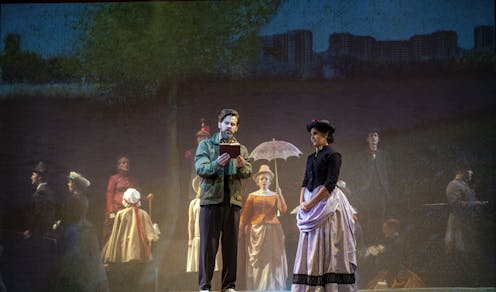Stephen Sondheim showed me the beauty, terror and exquisite pain of being alive
- Written by Sonya Suares, Guest Lecturer, WAAPA, Edith Cowan University

What did Stephen Sondheim mean to me? This is an attempt to bring order to the chaos.
My first encounter with his work is a re-run of the 1962 film adaptation of West Side Story (1957). I am about 7 or 8. It has an immediate effect on me - the lyrics and book especially. The translation of the familial divide in Romeo and Juliet to a story exploring social disadvantage, racial tensions and violence. It is thrilling, young as I am.
At 16, I see a live performance of Into The Woods (1986). I learn theatre can be playful and cerebral and ironic and emotionally compelling all at once. It resonates deeply with me as a passionate and bewildered teenager aching for guidance. Not only does it frame my understanding of theatre, it shapes the way I think about the human condition.
I am 26 and we are performing Merrily We Roll Along (1981) for our final production at drama school. “How will it all unfold for us?”, we can’t help but wonder.
It is a show I revisit over and over as an artist, including with the company I founded, Watch This, in 2017. When a once-in-a-lifetime pandemic has us all locked inside our homes, I play Sondheim’s incredible overture and soundtrack for my kids. We spend mornings dancing around and singing along:
Some roads are softAnd some are bumpySome roads you really flySome rides are roughAnd leave you jumpyWhy make it toughBy getting grumpy?Plenty of roads to try
Sometimes life rolls you into a ditch and you just have to lie there until you can crawl out. I lean on Sondheim’s music and lyrics to convey this difficult truth to my children.
Realising Sondheim
In 2011, I embark on the project of establishing a Sondheim repertory company Watch This. It staggered me Australia didn’t have one.
It was a singularly daunting thing to set my cap at realising such a weighty body of work with an independent company and all the constraints that entails. You want to do his work justice.
In inviting an audience to see a Sondheim show, I always try to be clear-eyed about how it speaks to us here and now.
In 2014, when we produced Pacific Overtures (1975), it was an election year and much of the political rhetoric was about “stopping the boats”.
Pacific Overtures is set in Japan after 200-odd years of deliberate seclusion from the world, at the moment of Western incursion. It was important for us to ensure the Japanese characters were centred in the narrative rather than being exoticised, with our audience positioned squarely as “the foreigners”.
We see the story unfold from a Japanese perspective, via our two heroes who are sent to the water’s edge to quite literally stop the boats and hold back the tide of history.
We staged Company (1970), a musical about relationships and intimacy, during the national marriage equality debate.
In a twist of fate, we programmed Into the Woods, a story about a motley collection of characters who must band together to confront an existential crisis, in 2020.
In 2019, I was lucky enough to co-direct Sunday in the Park with George (1983) with Dean Drieberg and an extraordinary team. It was an absolute career highlight.
It’s worth pausing for a moment here.
Often, people approach this musical as if it is all about George, the auteur-artiste. But Dot, his lover and muse, is equally important. She makes a stunningly difficult decision to prioritise a future for their child. Her choice is what propels us into act two.
George chooses a vertical eternity: he dedicates himself to “finishing the hat” so his experimental masterpiece may be suspended forever in a gallery. Dot’s choice extends horizontally across the axis of time: she lives on in the generations that follow her.
It is a show about legacy and mortality. Children and art.
An industry in mourning
It is a strange and disorienting thing to grieve for a person you’ve never met. I didn’t expect it to hit me as hard as it has. When you spend a decade inside someone’s works diving deeper and deeper into different worlds and myriad complex ideas, it is an incredibly intimate relationship.
I know I’m not alone in this feeling. Many people all over the world are experiencing a profound sense of loss. The grief within the theatre community is like an electric current. I cried on the phone to a longtime collaborator, because it is hard to explain to anyone outside our community: it feels so unbelievably personal.
Read more: Here's to the ladies who lunch: one of Sondheim's greatest achievements was writing complex women
In a 1988 interview with 60 Minutes, Sondheim was asked if he would have liked to have children. You can see the regret streak across his face. “Yes” he replies, but adds: “art is the other way”.
It is. There are generations of theatre-makers and audiences who have an immensely personal relationship with Sondheim’s work. That is his legacy. His musicals – even those that are 40 or 50 years old – still speak so directly to my own generation and those younger. His works are porous, allowing constant reimagining and immediate, contemporary connections.
Sondheim revolutionised the American musical and changed us along with it. He absolutely changed me. His career is testament to an artist’s need to take risks and transform, to get “through to something new”. And his works refract the beauty and terror and exquisite pain of being alive.
The fact that we reach for his lyrics and music as the very tools for processing his death points to Sondheim’s impact on the world he has departed. It is a giant’s footprint.
Authors: Sonya Suares, Guest Lecturer, WAAPA, Edith Cowan University





